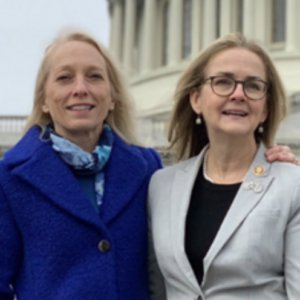Delaware Valley Democrats rejected a bipartisan bill hitting the brakes on banning gas-powered cars.
When the Preserving Choice in Vehicle Purchasing Act (H.R. 145) came up for a vote in Congress last week, all three Democrats in the local delegation — Reps. Madeleine Dean, Chrissy Houlahan, and Mary Gay Scanlon — voted against it. The measure protects consumers from state government bans on buying cars powered by internal combustion engines.
Bucks County Rep. Brian Fitzpatrick joined his fellow Republicans, along with eight Democrats. in passing the bill with a 220-190 vote.
The Environmental Protection Agency (EPA) can grant waivers to states to pursue more stringent clean car rules than the federal government. The state action at issue is California’s Advanced Clean Cars II rule, which states, “By 2035, all new passenger cars, trucks and SUVs sold in California will be zero emissions.”
According to The Wall Street Journal, “California is now asking the EPA for a new waiver to require that EVs make up an increasing share of cars sold in the state, from 35 percent in 2026 to 100 percent in 2035.”
In other words, a complete ban on new sales of gas-powered vehicles by 2035.
The House bill would stop that ban from going into effect, preventing the EPA from granting waivers that allow states to adopt rules that have the effect of banning the sales of gas-powered vehicles in any way.
“There is truly nothing more American than the freedom of the open road,” said Rep. John Joyce, M.D. (R-Altoona) during last week’s House debate. Since many states follow California’s lead on air pollution rules, its action could force automakers to stop producing and selling gas-powered vehicles, Joyce said.
“California regulators shouldn’t have the power to determine what vehicles are sold to families in Pennsylvania,” he said.
But California’s desire may impact Pennsylvania. The Keystone State has long looked to the Golden State for guidance on emission control standards. That includes partially copying the California Low Emission Vehicle Program in 1998. Former Gov. Tom Wolf (D) drafted a plan to join California’s 2035 requirement in 2021. He changed his mind a year later.
Reps. Dean, Houlahan, and Scanlon have all been boosters of the Biden administration’s energy policies, shutting down pipelines and revoking oil and gas leases, even as the price of gasoline has spiked. Under Biden, the national average for a gallon of gas broke the $5.00 a gallon barrier, more than double the average price of $2.39 on President Joe Biden’s first day in office.
The average price of gasoline in Pennsylvania is currently around $3.90 a gallon, about 40 percent higher than when Biden was sworn in.
The Pennsylvania Automotive Association (PAA) sees EVs as the future, but not by banning the competition.
“Pennsylvania’s franchised dealers are ready for EVs and are essential to widespread consumer EV adoption.” PAA President John Devlin told DVJournal. “Across the U.S., dealers have invested more than $5 billion in training and equipment needed to facilitate the education, sales, and service experience for EV customers.
“However, we believe California’s Zero Emissions Vehicle program goes too far, too fast, mandating that 35 percent of vehicle sales be electric by 2026 and 100 percent by 2035 and penalizing our manufacturers if they fail to reach these thresholds,” he said. Devlin thinks affordability, consumer incentives, charging infrastructure, and model availability are the best focus.
Pennsylvania drivers aren’t on board with a gas-engine ban. Of the more than 8 million registered vehicles in the Keystone State, fewer than 48,000 are EVs, according to U.S. Department of Energy statistics. And that’s despite billions of dollars in federal and state subsidies to EV buyers, subsidies that go disproportionately to the wealthy.
Even in California, regulations forcing trucking companies to add only electric trucks to their inventory are getting a reality check. According to National Review, “There were fewer than 300 electric trucks on California roads last year. Under the regulations, there will need to be more than half a million by 2035.” Not to mention, the sheer cost of an electric truck is often too high for many truckers in the state, regardless of the tax credits.
Asked why they backed the ban on gas-powered cars and if they believe Pennsylvania should follow in California’s footsteps, Reps. Dean, Houlahan, and Scanlon all declined to respond.

